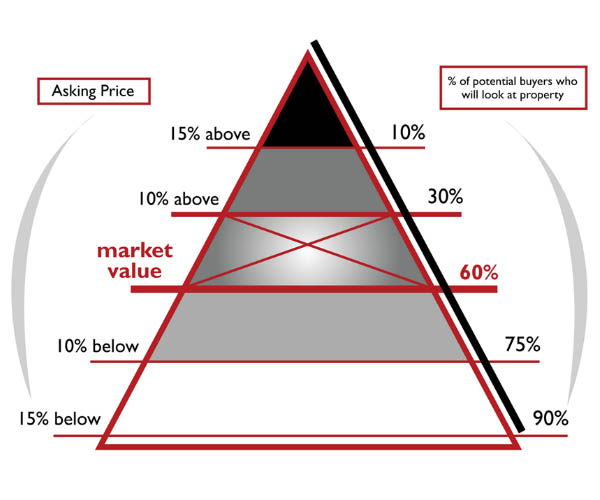 There are many ways to determine how much a home is worth. Appraisers use 3 different theories, and real estate agents us a combination of these methods. Once you have a number that you believe your home is worth, then you have to determine what list price you will choose in order to sell your home in the time that you need. A value is a starting point, but your actual listing price could be higher or lower.
There are many ways to determine how much a home is worth. Appraisers use 3 different theories, and real estate agents us a combination of these methods. Once you have a number that you believe your home is worth, then you have to determine what list price you will choose in order to sell your home in the time that you need. A value is a starting point, but your actual listing price could be higher or lower.
Pricing your home can be quite emotional. A home becomes personal and most home owners not only want to make a profit, but they want to get an additional amount for each improvement they made. The market may not dictate these improvements into actual increased value however. The market also doesn’t care how much you may need to move on. Imagine if you will that you are buying your next home, the house is worth $150,000 but the sellers need $200,000 to buy a new house. What are the chances you will just give them an extra $50,000 because they need it? None. The same is true for your house. Simply put, it is worth what it is worth. Your needs will not be taken into account. Even if you owe more than it is worth. In this case, short sales are often your only choice.
Agents take into account recent sales, typically within 1 mile of your home, that are similar to your house. They then make adjustments based on any differences in your home when compared to the sold homes. For instance, maybe your home doesn’t have a basement while a home that sold recently had one, or you have an extra bedroom or in-ground pool. Some changes mean adding or taking away value based on area averages and desire. A pool could be a positive or a negative, so some changes are more variable than others.
Once your agent has a value they will (or should) explain what price will get the most showings and the best chance of a quick sale. This is mostly a statistical calculation that follows the bell curve. If your house is priced below market value, more people will be interested, simply because everyone likes a deal. If your house is priced above market value, the pool of buyers will be smaller. If it is priced right at market value you will get the normal amount of viewers. Pricing your home below market value may seem like a gamble, and it is. You could only get offers that are less than your home is worth. On the other hand, you could start a bidding war between buyers that know the value of the home, potentially raising your final sales price higher than your home’s actual value.
Price points can also come into play. Internet searches are typically done in price ranges rather than specific prices. For instance, someone can search for homes up to $150,000 or from $150,000 to $200,000 to narrow their search to a realistic number of homes. If your home is priced at $154,000 you will miss those searching only up to $150,000, but if your home is priced at $149,999 you will miss those searching from $150,000 to $200,000. Knowing which price range is best is part of your agents job and will be based on current market stats.
The biggest thing to know about pricing your home is that the market changes quickly and you need to be ahead of it, not making changes reacting to problems after they happen. This can be difficult but a good agent will prepare you for changes before they ever occur. New houses that go on the market, houses that go under contract, responses from viewings and other agents, and lots of viewings with no offer can all lead to suggested price changes. A good agent will make sure you know that they will be making price change suggestions if specific metrics are not met.
Some agents are afraid to make price change suggestions, or even tell you the true value of your home. These agents come in and ask you what you want for your house and agree to list it at that price just to get the listing. For them it is a numbers game, enough listings and they will definitely make a sale. I often hear from clients that had their house on the market for awhile with another agent with no results. Typically they heard several values from different agents and they went with the agent that said it was worth the most. After the house sat on the market for 6 months with no viewings or offers they finally realized maybe there was an issue. When you are interviewing agents be open to what they are suggesting as a price, even if it is less than you think or need. The first 3 weeks of being on the market is when you get the most viewings, so if your home is priced too high, you will be playing catch up throughout the listing period and these homes often end up selling for under market value simple because buyers believe there is something wrong with it since it has been on the market for so long.
